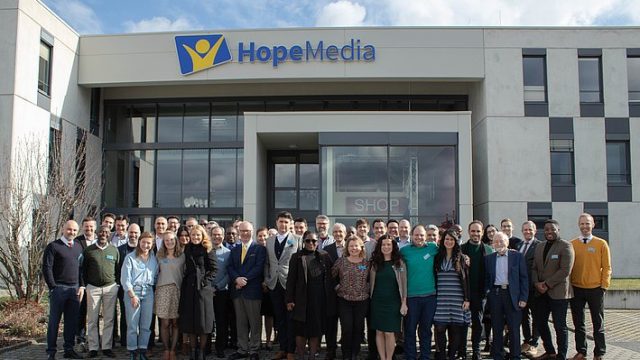There are no shortcuts to heaven, no multiple entry points, yet our journeys can be very different.

It was one of those amazing photographs, where the photographer had just caught everything at the right millisecond. When I said as much, the photographer laughingly explained, “It was taken on a cloudy miserable day, I just tinkered around with Photoshop until I got the color balance right. Surely you are not so naïve as to believe that any image you see is the original? Reality is irrelevant, it’s all about presenting the perfect image.”
In a world obsessed with presenting a “perfect” life, through “perfect” pictures, we are challenged when we are confronted with a less-than-perfect reality, in our homes, at work or school and in the church.
Ask any group of members, old or young, for their views about the church and sooner or later the criticisms creep out. “It’s time for an upgrade. It’s time for the church to come into the twenty-first century. Our structures are so outdated. Why can’t the church be more . . . ” the list is long. If only everyone saw the world from our perspective then we would have the perfect church, or would we?
The five Ps
The church is a home for sinners who, by definition, are broken people living in an imperfect world. These are not the easiest of people to live with and sooner or later tensions will emerge. This is not a new problem. Jesus experienced the same problem with His disciples. After three years with Jesus, the disciples were still bickering over who was the greatest, and who should have the best position in the Kingdom. We should not be surprised when two thousand years later there are still tensions and challenges living as part of God’s remnant people. Five P’s may be the key to doing more than just surviving: preference, perspective, prejudice, practice, and principle.
Preference
Some things are a matter of preference. There is no right or wrong, just preference. For example, we should eat five portions of fruit and vegetables per day. I like some fruits and vegetables more than others: it’s my preference. The same applies in the church. I may prefer a red carpet, my brother a blue. Neither is right or wrong or better than the other. It is a matter of preference, yet churches have been divided over the color of a carpet or other furnishings. Before starting a new crusade, it is always worth asking: is this a Biblical truth or a preference? If we are honest, after a few weeks we do not even notice the blue carpet, which we disliked so much.
Perspective or Prejudice
Coventry Cathedral in England was bombed during the World War II. Following the war, a chapel of unity was built in the shape of a Crusader’s tent. The “folds” of the tent form alcoves around the walls. It is only possible to see all the alcoves by standing in the center of the chapel and slowly turning around. From any other position, something always obscures your view.
We all have blind spots or prejudices; opinions or feelings which are not based on fact, logic or experience. Things that obscure our view, making it difficult for us to see and understand things from another’s viewpoint. Letting go of our prejudices and perspectives, opens untold possibilities. Jesus demonstrated this at Jacob’s Well, where he talked with a disreputable woman. Breaking down her prejudice, changing her perspective about herself, resulted in a whole village learning about Jesus and the seeds were planted for the disciples to develop a better understanding of mission.
Practice
As children grow up there comes a point when they ask “Why?” Why do I have to brush my teeth? Why do I have to go to school? Why this? Why that? A thousand Whys? It is a normal, natural part of growing up. Each new generation asks the same questions in the church. They challenge the older generation. This can lead to conflict. We should encourage examination of how we do things and not be stubborn and hold onto a preference. Looking at ways of asking and discussing is this practice, or way of doing things, just my preference, the way we have always done things, or is it a principle?
Principles
Some things are non-negotiable. They are core to our identity. Salvation by faith. The Sabbath. The sanctuary. The second coming. God’s Holy Law. These are eternal truths which identify the remnant, yet sometimes we wrap our expression of them in our own preferences and practices which make it difficult for others to understand.
Jesus told His disciples: “I am the way and the truth and the life. No one comes to the Father except through me” (John 14:6). He is still the way, the truth and the life. There are no shortcuts to heaven, no multiple entry points, yet our journeys can be very different.
As we drove from the airport, to my western eyes, it was chaos, but to my driver it was normal. Cars, donkeys, bicycles, camels, trucks, and pedestrians all shared the road. All were going in the same direction, but our experiences were very different. Sitting in an air-conditioned car, we were protected from the heat and dust. The relative comfort of riding a donkey or camel was preferable to walking. The cyclists were able to move quickly weaving between the traffic, and the pedestrians somehow negotiated a way through it all.
We are all on the same journey. Where we live, our life experiences and opportunities color how we view the world. Some travel in air-conditioned cars, while others walk with heavy loads in the heat and dust. Along the road we need to ask ourselves what is preference, perspective, prejudice, practice, and principle. If it is any of the first four, perhaps we need to accept we may have an imperfect view. What really matters is Jesus. With Him in the center of our lives and in our church, we can see more and become more accepting of each other. All of us are flawed as the wise man said, “If a man’s ways please the Lord even his enemies will be at peace with him” (Prov. 16:7 ESV).
Audrey Andersson, originally from Ireland, serves as the executive secretary of the Trans-European Division and lives in St. Albans, United Kingdom.








